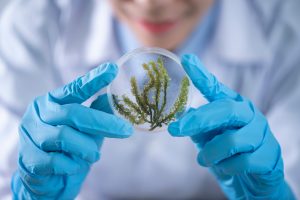
Unlock the Secrets of Biology and Microbiology Today – Discover the Difference and Relationship Now!
For many people understanding biology and microbiology can be quite challenging, but still, you can learn these exciting subjects through interesting learning methodologies. You can gain an insight into how biology and microbiology affect our daily life and can discover the differences between them and how they work together in the ecosystem.
Introduction
The relationship between Biology and Microbiology is quite simple, yet powerful: Biology is the study of life at a macroscopic level, while Microbiology focuses on studying life at a microscopic level. In other words, Microbiology has emerged from Biology and till recent times, Microbiology was considered a sub-branch of Biology.
Biology refers to studying life. Biology deals with studying the anatomy, physiology, genetic makeup, evolution, and ecology of living organisms. It also covers non-biotic (non-living) aspects of the environment, like climate, weather, and soil composition. On the other hand, Microbiology deals with the study of microscopic living organisms like bacteria, viruses, fungi, protozoa, and algae.
Though understanding Biology is important for understanding life but Microbiology is even more important for understanding all life forms on earth. Because microscopic organisms are ubiquitous in nature and have outnumbered macroscopic living species. Besides, microbes are also one of the major determinants of human health, and they have an important role in the biosphere. By studying life at a microscopic level, we can have a better understanding of the functioning of our living planet and the interactions between living organisms.
Unlock the Secrets of Biology and Microbiology Today and discover the difference and relationships between them. With the help of this knowledge, you will be able to understand the importance of microbes and their impact on the world around us.
Biology vs Microbiology Major
Biology and microbiology are two closely related fields of life sciences that study the structure, functioning, and interactions of different types of living organisms. While both fields study the origin, distribution, structure, functioning, and interactions of different living organisms, there are several key differences between these two sciences.
The main difference between biology and microbiology is that while biology primarily concerns studying living organisms and non-living things associated with living organisms, microbiology is a sub-field of biology that relates to the study of microorganisms. Furthermore, biology is a diverse field while microbiology is far more specific than biology.
Biology is considered the major life science and it covers the study of life forms. Biology mainly discusses morphology, physiology, anatomy, behavior, origin, and distribution of living organisms while microbiology deals with the study of only life forms at the microscopic level that is unicellular organisms or life at the cell-cluster level.
In addition, Biology also takes into account the non-biotic factors and how they interact with living beings whereas microbiology is strictly confined to microorganisms.
Is Microbiology Harder than Biology?
Comparing the complexity of biology and microbiology is difficult since each branch of science requires a different set of skills and knowledge. While both fields require extensive knowledge and study, microbiology is more challenging in the sense that it only focuses on microscopic organisms. As these microscopic organisms are not visible to the naked eye so at times, students struggle to grasp the anatomy, physiology, and biochemistry of these extremely minute living beings.
In contrast, Biology is easier as concepts of its main courses like zoology, botany, physiology, and genetics, among others, can easily be observed in daily life. Biology covers the structure, function, growth, origin, evolution, and distribution of all living organisms that we see every day.
Unlike macroscopic life-form, microorganisms are too small to be seen with the naked eye, and therefore microbiologists must use a microscope to observe them. This means that understanding the anatomy and physiology of microorganisms requires a greater level of detail and precision compared to larger organisms which can be seen easily. Additionally, microorganisms require specialized techniques to handle, cultivate and analyze them.
Moreover, microbiology also involves studying the interactions between microorganisms and their environment, as well as their effects on other living organisms, including humans. This includes examining the immune system and how it responds to microorganisms.
Therefore, while both biology and microbiology are complex fields of study, many consider microbiology to be more difficult due to its greater specificity and complexity.
Similarities Between Biology and Microbiology
Biology and microbiology are two interrelated academic disciplines that bear many similarities. Because of certain similarities, they are often studied together. But it must be bear in mind that both disciplines are quite different from each other. So, understanding the relationship between these two fields of study can help you better appreciate the complexity of life and the environment.
In the succeeding section, we will unearth their mutual relationship by looking at the similarities and differences between biology and microbiology.
Similarities Between Biology and Microbiology
- Both biology and microbiology involve the study of living organisms. They both involve the examination of the structure and function of cells, tissues, and organs.
- Both disciplines are used to diagnose and treat diseases.
- Both involve the use of laboratory techniques such as microscopes, culture media, and genetic analysis.
- Both academic disciplines try to decode the mechanism of life and how our abiotic (non-living) environment affects us.
Differences Between Biology and Microbiology
- The major difference between Biology and Microbiology is their focus of study. While Biology deals with the study of Macroscopic life-form, Microbiology tries to look into life at the microscopic level.
- Biology examines organisms in their entirety while microbiology looks at the individual components of life.
- Biology is a broad field and is a parent discipline having many sub-branches while microbiology is a sub-branch of Biology that has evolved into a full-academic discipline recently.
- Biology explores the evolution of species while microbiology studies the evolution of individual microorganisms.
Relationship Between Biology and Microbiology
The relationship between biology and microbiology is an important one. By understanding the similarities and differences between the two disciplines, we can gain a better understanding of how life on Earth works.
Microbiology helps us to understand the basics of life such as cell structure, genetics, and metabolism. This knowledge can then be applied to larger organisms in the field of biology.
At the same time, the understanding of larger organisms gained through biology can help us to understand the behavior of microorganisms. For example, by studying the immune system in humans, we can gain insight into how bacteria and viruses interact with our bodies.
Overall, biology and microbiology are closely linked and work together to form a better understanding of life and the environment. By studying both disciplines, we can gain a complete picture of the world and how it works.
Conclusion
In conclusion, Biology and Microbiology are two distinct and fascinating areas of science. While they have many similarities, such as their focus on studying living organisms, they differ in the level of detail that is studied. Microbiology focuses on smaller, microscopic organisms, while Biology explores a broad range of life forms.
Both of these fields have the potential to unlock secrets about the natural world and can help us understand the relationships between living organisms. By studying both Biology and Microbiology, we can gain a more comprehensive understanding of the world around us.


